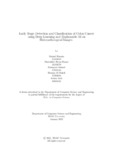Early stage detection and classification of colon cancer using deep learning and explainable AI on histopathological images
Abstract
Colon cancer is one the most prominent and daunting life threatening illnesses in
the world. Histopathological diagnosis is one of the most important factors in determining
cancer type. The current study aims to create a computer-aided diagnosis
system for differentiating tissue cells, benign colon tissues, and adenocarcinomas
tissues of the colon, using convolutional neural networks and digital pathology images
for such tumors. As a result, in the coming years, artificial intelligence will be
a promising technology. The LC25000 dataset, which included 5000 photographs
for each class, produced a total of 25000 digital images for lung and colonic cancer
cells, as well as healthy cells. The photos of lung cancer were not included in our
study because it was primarily focused on colon cancer. To categorize and classify
the histopathological slides of adenocarcinomas and benign cells in the colon,
a Convolutional neural network architecture was implemented. We also explored
optimization techniques such as Explainable AI techniques, Lime and DeepLift to
better understand the reasoning behind the decision the model arrived at. This
allowed us to better understand and optimize our models for a more consistent accurate
classification. Diagnosis validity of greater than 94% was obtained for colon
distinguishing adenocarcinoma and benign colonic cells.

